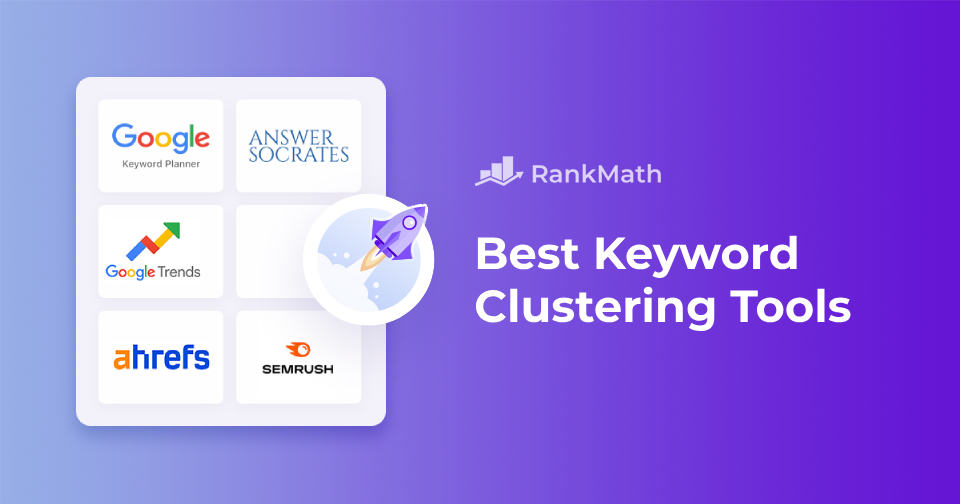When you’re working on SEO, finding the right keywords is only half the battle. The real challenge lies in organizing them in a way that makes your content more relevant, user-friendly, and search engine-friendly. That’s where keyword clustering comes in.
Instead of targeting just one keyword per page, grouping related keywords together can help you rank for multiple terms, improve topical authority, and attract more qualified traffic.
The good news is, you don’t have to do it manually.
With the right keyword clustering tools, you can quickly group related keywords, streamline your content strategy, and boost your rankings with less guesswork.
In this post, I’ll walk you through some of the best keyword clustering tools that can make this process easier for you.
So, without any further ado, let’s get started.

Table Of Contents
1 What is Keyword Clustering?
When you’re working on SEO, it’s easy to collect a massive list of keywords and then feel stuck on how to use them. That’s where keyword clustering helps you. Instead of treating each keyword separately, you group similar ones together based on meaning and search intent.
This matters because Google’s RankBrain looks at the overall topic and context of your content, not just whether you use one exact keyword.
So, by clustering keywords, you’re showing Google that your content fully answers what users are searching for, no matter how they phrase their queries.
Advantages of Using Keyword Clustering Tools
Keyword clustering gives you several advantages:
- More Relevant Content: You can write content that matches exactly what your audience is looking for. For example, if you’re running a travel blog, grouping keywords like best budget destinations, cheap flights, and affordable hotels helps you create a complete guide that answers all related queries in one place.
- Better Content Structure: When you cluster keywords, it’s easier to plan your blog posts and website pages without overlapping topics. This helps avoid keyword cannibalization, when two of your posts compete for the same keyword, and ensures every topic has its own space.
- Improved Rankings: Search engines love well-structured, comprehensive content. By clustering keywords, you give yourself a better chance of ranking for multiple terms within the same cluster, instead of just one.
- Time Savings: Instead of manually sorting through hundreds of keywords, keyword clustering tools can group them for you. This saves you hours of work and lets you focus on writing great content.
2 Best Keyword Clustering Tools
Now that you understand what keyword clustering is, let’s look at some tools that can make the process easier for you.
2.1 Google Keyword Planner
Using Google Keyword Planner as a keyword clustering tool involves using its powerful keyword research capabilities to identify and organize related keywords into meaningful clusters.
To start, access Google Keyword Planner through your Google Ads account.
Once logged in, navigate to the Keyword Planner, as shown below.
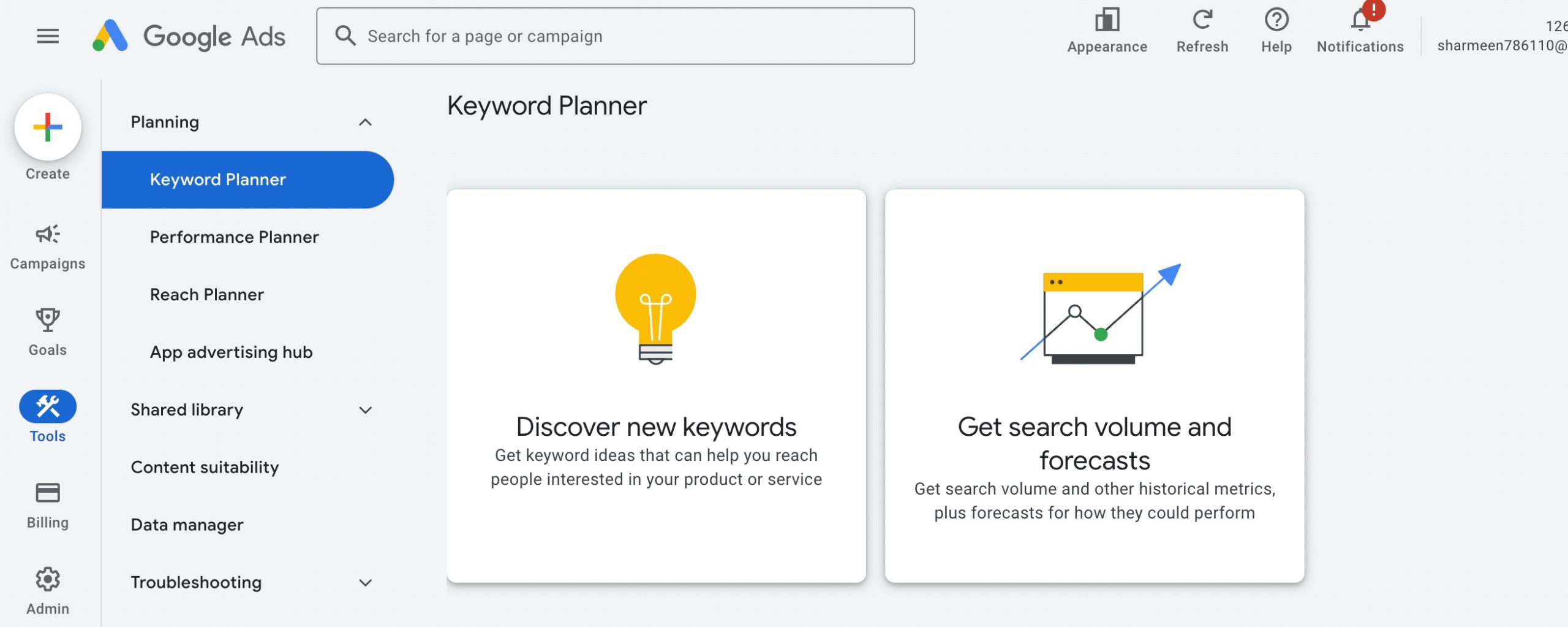
Start by selecting the Discover new keywords option.
Next, navigate to the Start with keywords tab. Enter a broad keyword or phrase related to your niche or business. For example, if you run a fitness blog, you might enter workout or fitness.
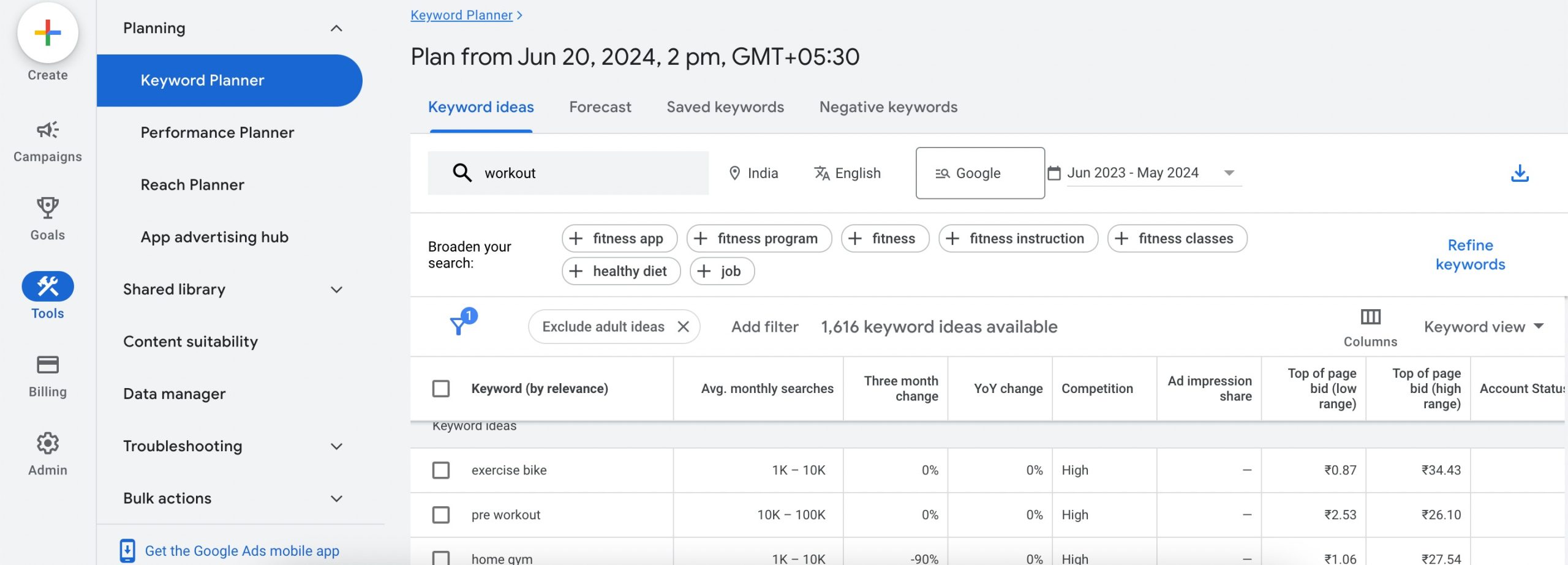
Once you input your initial keyword, Google Keyword Planner will generate a list of related keywords along with their search volume, competition level, and other relevant metrics.
Next, create keyword clusters by grouping related keywords. Instead of using the Keyword view, switch to the Grouped view, as shown below.
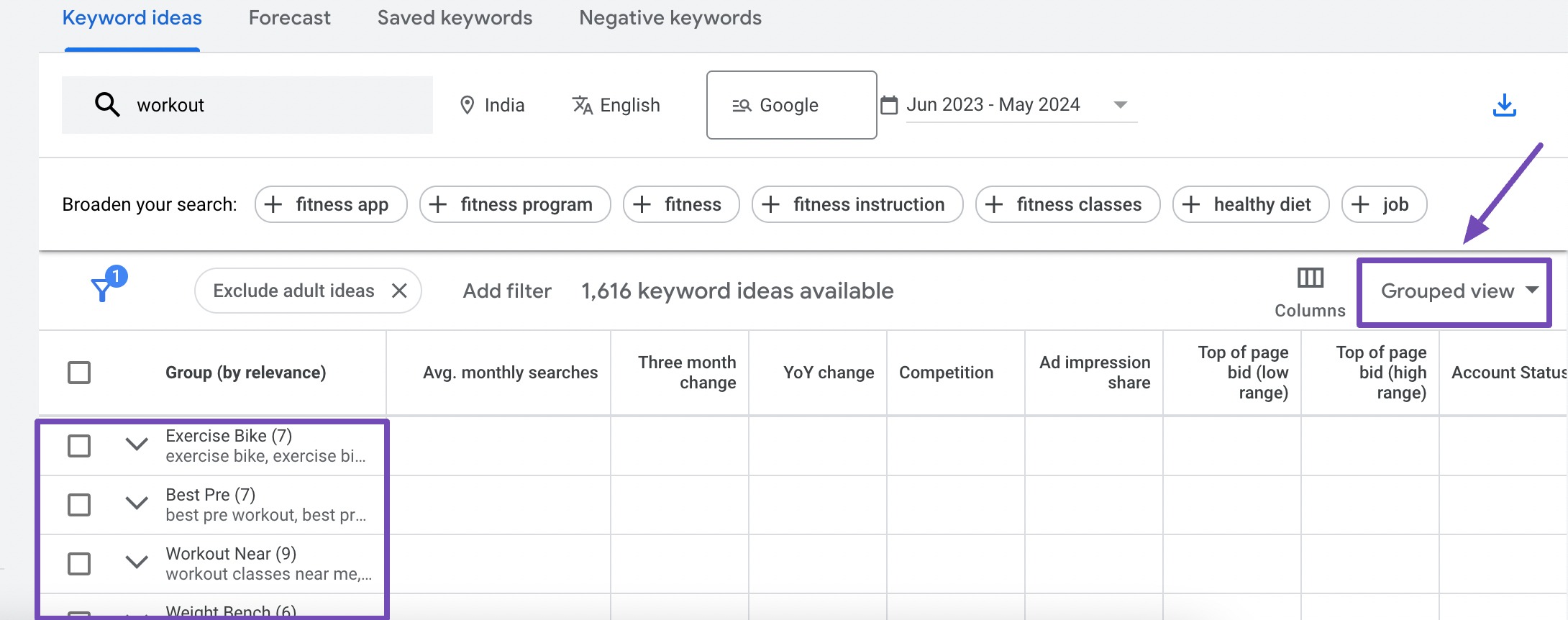
In this view, you’ll see a list of keywords organized by relevance. This feature is incredibly useful because it shows all the keywords you can target in a single article, giving you a clear picture of potential ranking opportunities.
To further refine your clusters, use the filtering and sorting options in Google Keyword Planner. For instance, the Best Pre group includes all the keywords related to pre-workout. You can then sort keywords by search volume or competition to prioritize the most valuable keywords within each cluster.
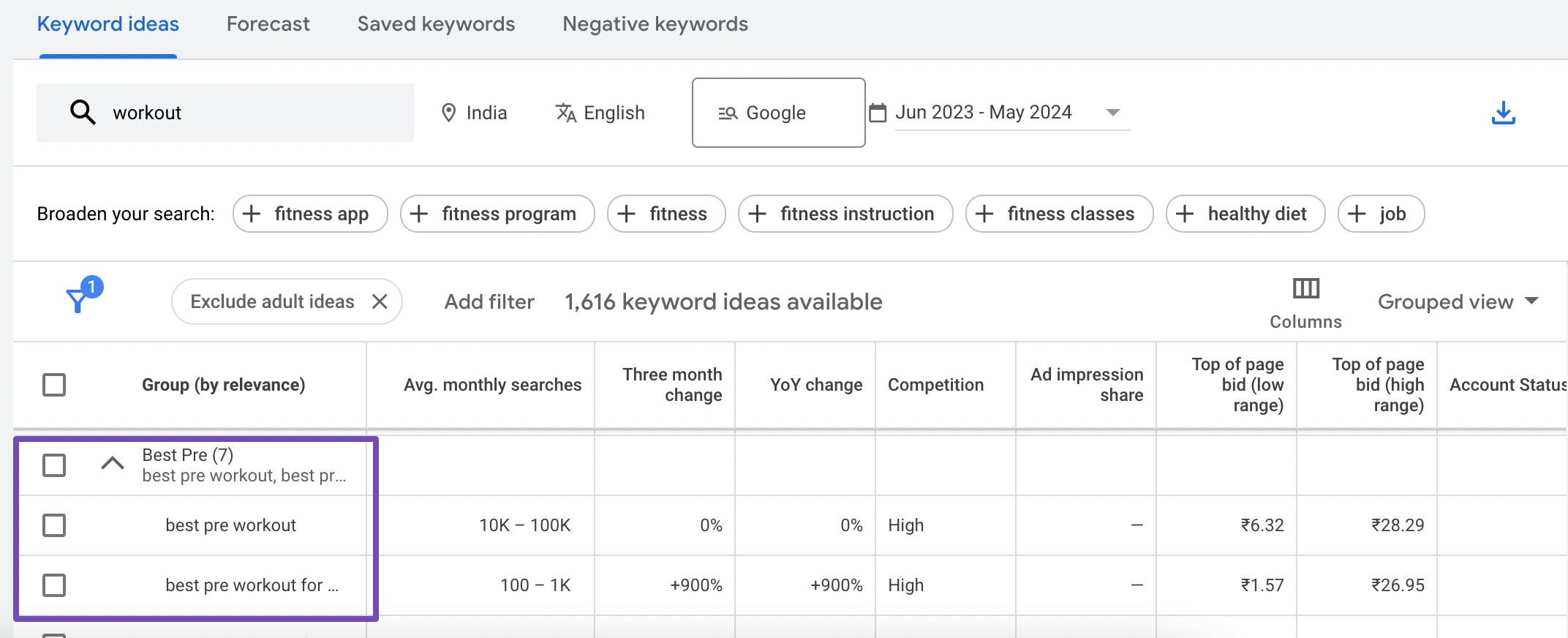
This helps ensure that your content targets high-traffic and less competitive keywords, maximizing its potential impact.
2.2 RankBot
Rank Math’s RankBot helps you create keyword clusters with just a few clicks.
To get started with Rank Math’s Content AI, at first, you need to enable the Content AI module.
Head over to Rank Math SEO → Dashboard → Modules inside your WordPress admin area. From the list of available modules, enable the Content AI module as shown below.
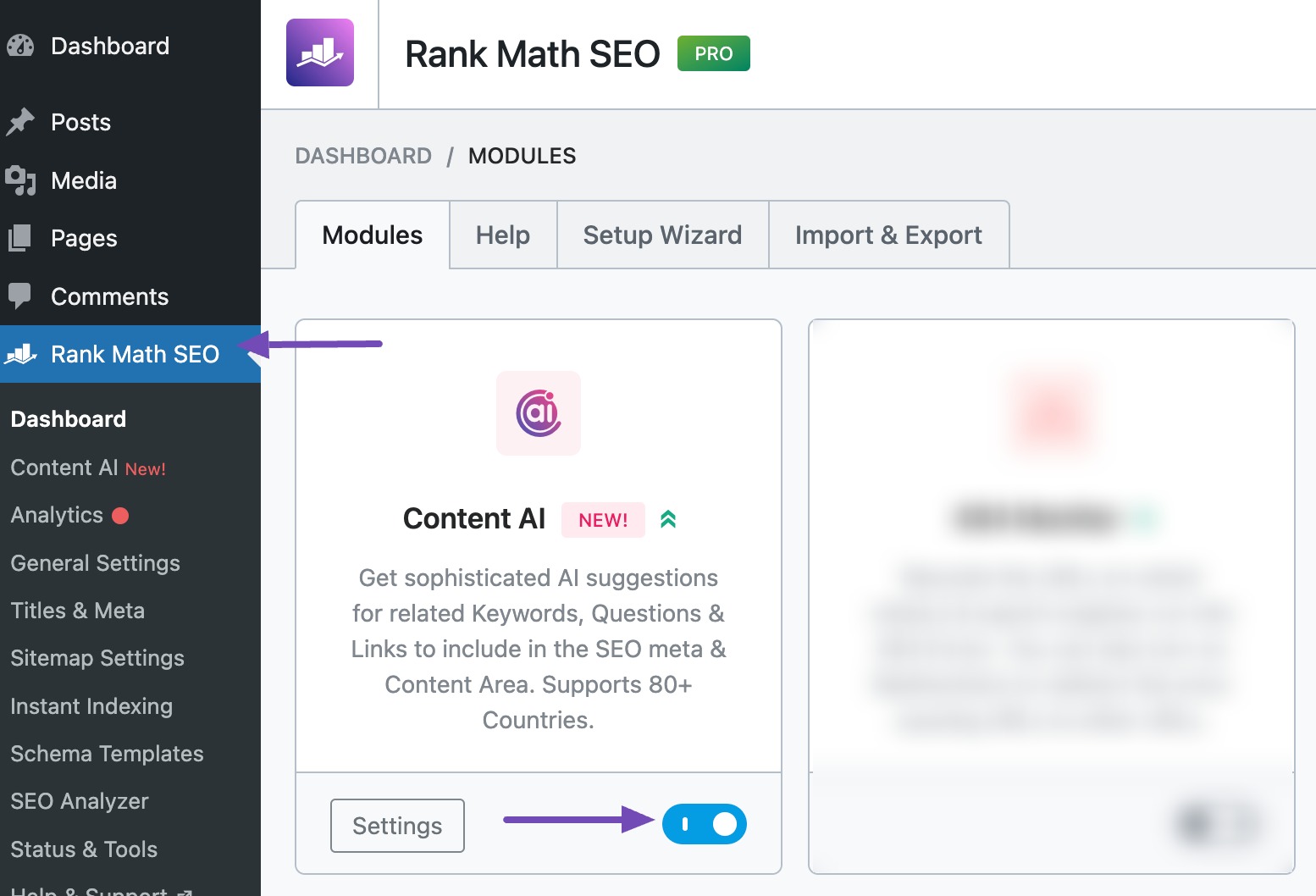
To access RankBot, navigate to Rank Math SEO → Content AI → Chat from your WordPress dashboard once you’ve enabled the Content AI module.
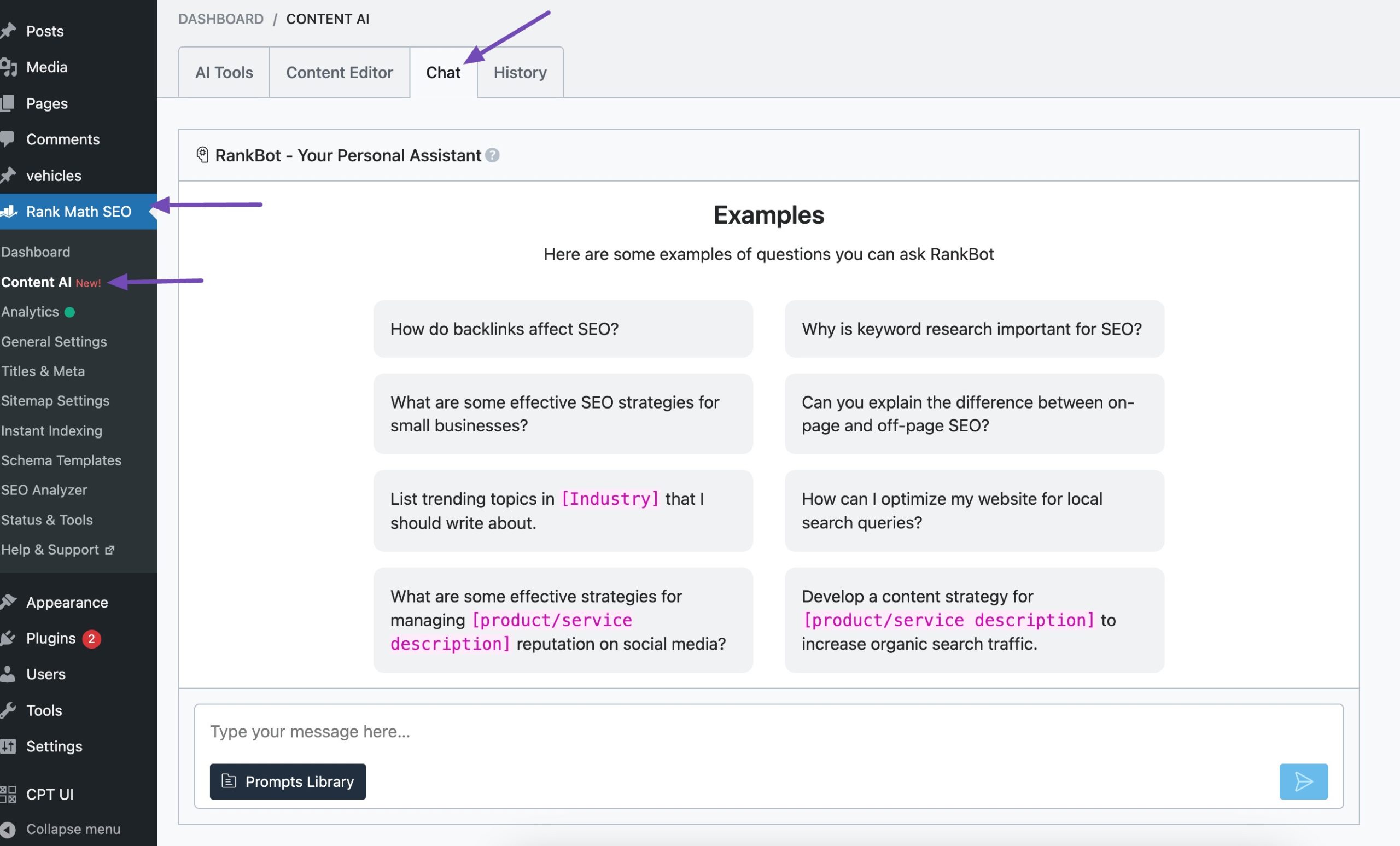
In the RankBot input field, enter a prompt like this to generate keyword clusters:
Cluster the following list of keywords into groups based on their topic. Each group should contain keywords that are closely related to each other and have the same search intent. Here is the list of keywords: [keywords]
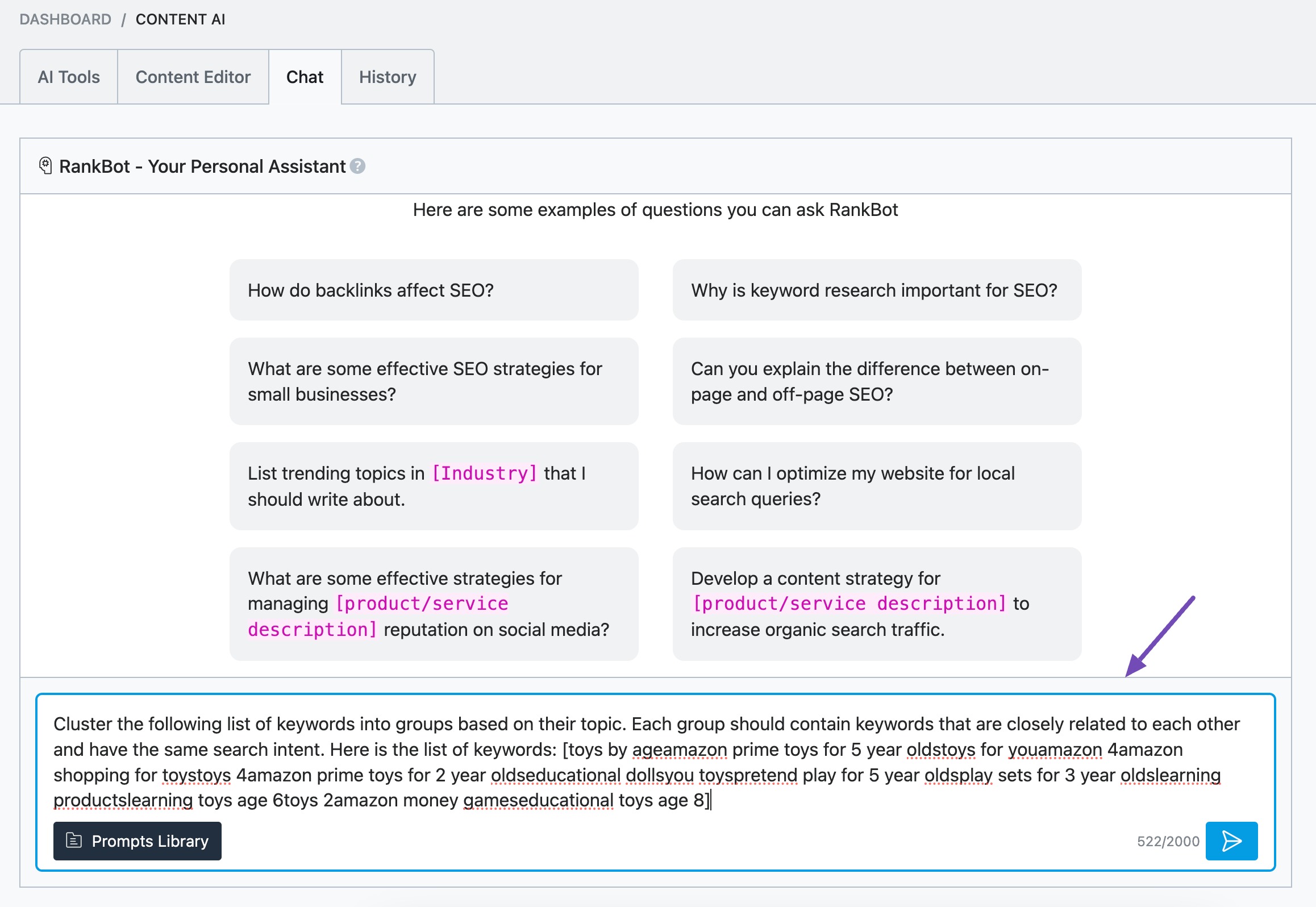
Once RankBot has processed your keyword list, you’ll be presented with clusters of related keywords.
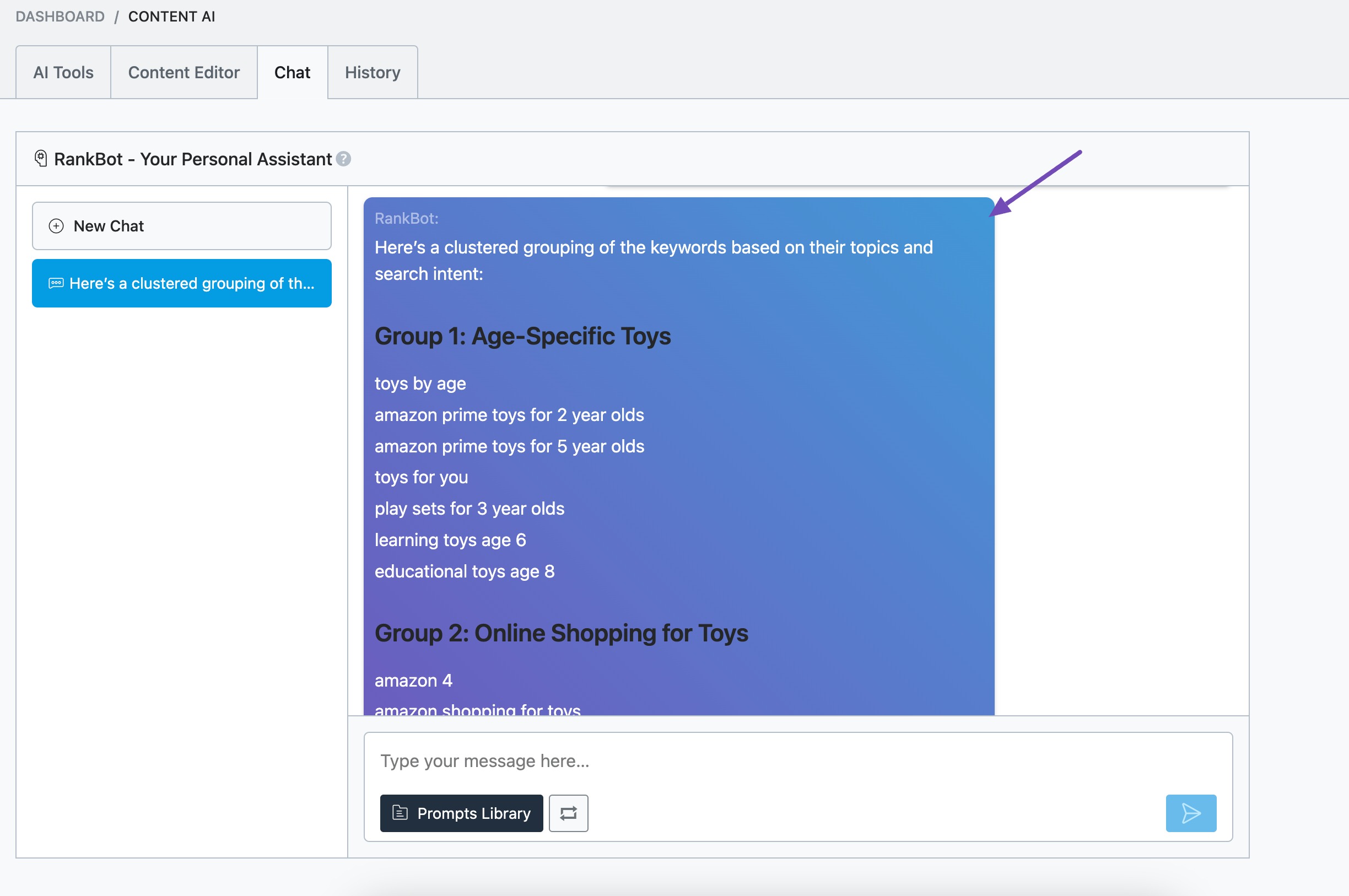
2.3 Ahrefs Keyword Explorer
Using Ahrefs Keyword Explorer to find and cluster keywords is a straightforward process that can significantly enhance your SEO strategy.
First, log in to your Ahrefs account and navigate to the Keyword Explorer tool. Enter a keyword or phrase relevant to your niche. For instance, if you run a fitness blog, you might start with fitness as a keyword.
Once you enter your keyword, the Overview report in Ahrefs will generate a comprehensive report listing related keywords, search volumes, keyword difficulty scores, and other valuable metrics.
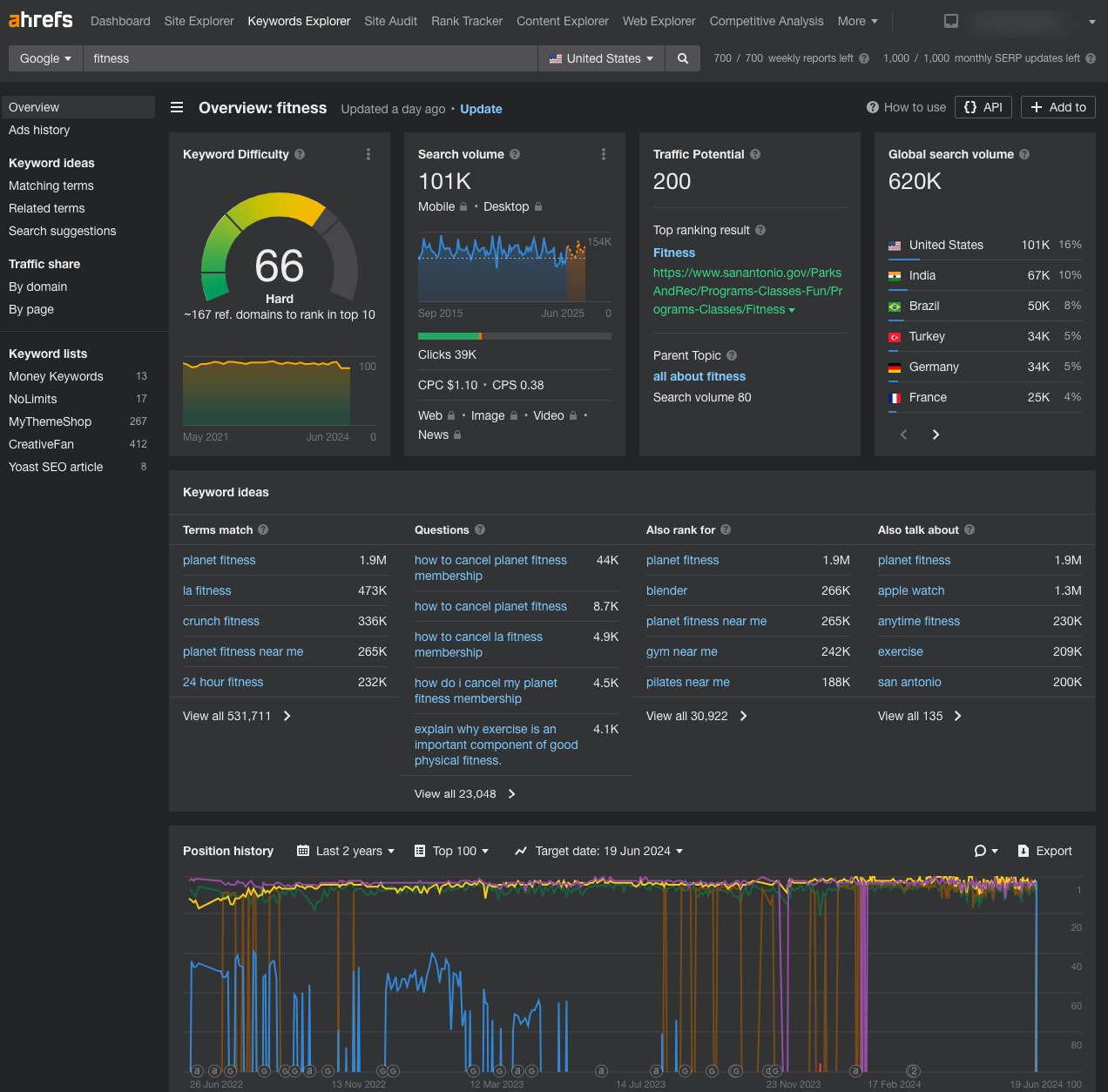
After generating the keyword report, navigate to the Terms match section. This will filter the keywords to show only those that include your seed term. You’ll see keywords that contain your seed term along with relevant metrics.
Identify keywords with the same user intent and group them into clusters. For instance, you can create clusters such as lifetime fitness, crunch fitness, etc.
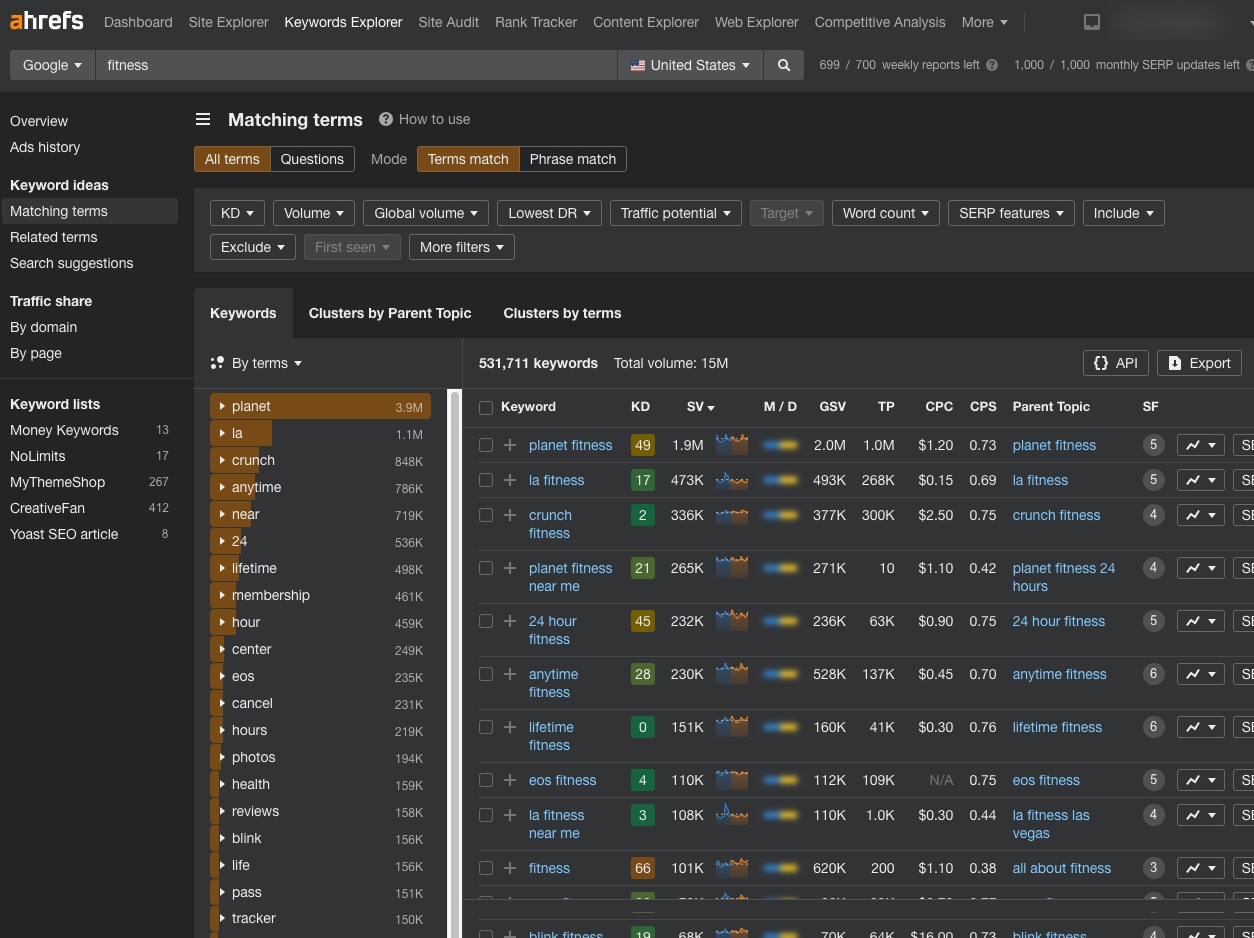
To refine your clusters, use the filtering and sorting options in Ahrefs Keyword Explorer. You can sort keywords by search volume or keyword difficulty to prioritize the most valuable keywords within each cluster.
3 Frequently Asked Questions
How do keyword clustering tools work?
Keyword clustering tools use advanced algorithms to analyze keywords based on similarities and search intent. They automatically group related keywords into clusters, simplifying keyword organization.
Can keyword clustering tools integrate with other SEO tools?
Yes, many keyword clustering tools integrate with popular SEO tools like Google Keyword Planner and Ahrefs, allowing for the import and export of keyword data.
How often should I update my keyword clusters?
It’s recommended to update your keyword clusters regularly, at least quarterly, to keep up with changing search trends and ensure your content remains relevant and competitive.
How can keyword clustering improve my content strategy?
By identifying and organizing related keywords, keyword clustering helps you create more focused and comprehensive content. It ensures that your content addresses various related queries and improves overall SEO performance.
Can keyword clustering tools help with local SEO?
Yes, keyword clustering tools can help identify and group local keywords, enabling you to create content that targets specific geographic areas and improves local search rankings.
4 Conclusion
Keyword clustering might sound like an extra step in your SEO process, but once you start using the right tools, you’ll see how much time and effort it saves you.
I’ve found that instead of juggling endless keyword lists, clustering helps to stay organized and create content that’s both more strategic and more effective.
When you use keyword clustering tools, you’re not just guessing which keywords to target; you’re building a good structure that makes your content stronger and your rankings more achievable.
So the next time you’re planning content, try grouping your keywords first. You’ll find it much easier to cover topics in depth, avoid overlap, and connect with your audience in a more meaningful way.
If you like this post, let us know by tweeting @rankmathseo.
